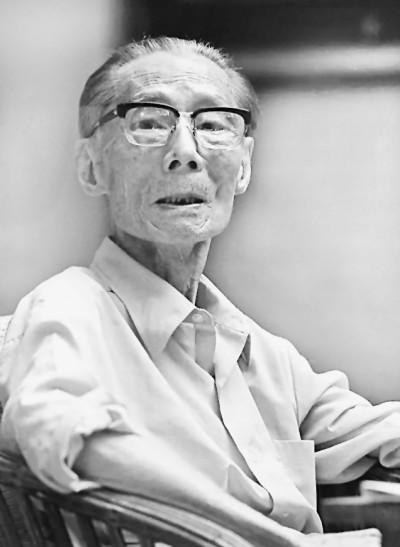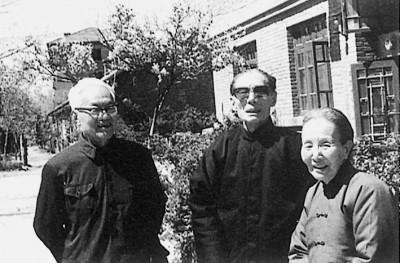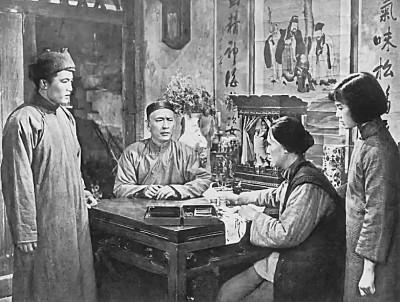Xia Yan: Simple and Pure Personality and Style of Writing
Since the 1930s, when people evaluate and discuss Xia Yan’s literary and artistic creation and its individual characteristics, they tend to be associated with key words such as realism, refinement, dilution and significance. Just as in July 1943, Ye Shengtao wrote a poem for Xia Yan’s play "Fascist Bacteria", which was well received by all walks of life in Chengdu: "Xia Yan’s style is simple and clear, and Chinese drama art is well-known. I am glad to hear that today’s two difficulties are combined, and I will see the glory moving to Jincheng. " It has to be said that simplicity and elegance are not only the artistic style of Xia Yan’s masterpiece Fascist Bacteria, but also the consistent and beautiful experience brought to readers and audiences by a large number of well-known chapters left by Xia Yan’s various creative practices for more than 60 years.

Xia Yan
Beyond written expression, stage performance, screen projection and other media forms.
The historical situation of the modern world and modern China, especially the development trend of "left-wing" culture and revolutionary literature and art since the May 4th New Culture Movement, together with the integration of China and foreign countries, the intellectual literacy and the literary talent with pure nature and flourishing heart, not only prompted Lu Xun, Guo Moruo and other outstanding ideological enlighteners to give up their own "scientific" ambitions and embark on the road of soul salvation, but also "abandoned their jobs and joined the literature" for young Xia Yan and became China.
According to incomplete statistics, in the whole 20th century, during his revolutionary career and writing practice of more than 60 years, Xia Yan occasionally dabbled in or intensively worked on investigation reports, translated works, current affairs reviews, movie scripts (original or adapted), drama scripts (original or adapted), reportage, short stories, poems, radio plays, news interviews, close-up editorials, newspaper supplements, essays and essays. He has also published or published far-reaching works in the fields of film, drama and literature theory and criticism, wandering freely between creation and theory and criticism, and galloping between originality and translation and adaptation. His carrier spans many different media forms such as written expression, stage performance, broadcast transmission and screen projection. Although in the history of modern culture, many intellectuals have intentionally or unintentionally devoted themselves to this rich and diverse cross-media writing, it is rare to see such extensive, in-depth writing practice as Xia Yan’s, which has made great achievements.
It is particularly noteworthy that Xia Yan’s cross-media writing always meets the needs of the times and reality, and has been developed and gradually completed in his social activities and revolutionary practice. In this process, Xia Yan always turned to many teachers, worked diligently and quietly, and integrated his unique social experience, personality characteristics and spiritual temperament into different genres, themes and media, forming a simple and elegant personality and style of writing. During the "Left-wing League" period, Xia Yan was deeply influenced by Qu Qiubai, and changed and rewritten the seemingly ordinary news report in the newspaper to make it a literary work with ideological significance, artistic appeal and stronger "accusation", so as to freely switch between news style and literary style. Tian Han also made it clear in the preface to "A Story of Sorrow for the City" that Xia Yan’s accomplishment as a journalist is also very helpful to the playwright. In his view, without the sensitivity of the times and familiarity with and insight into social events, Xia Yan might not have written such excellent modern dramas as One Year, Heart Prevention, and A Story of Sorrow for the City. At the same time, Xia Yan’s theory of time or plays made people feel "consistent and sincere thoughts of worrying about the time".
Because of this, Xia Yan will constantly change his professional identity and try to write across the media according to the situation and needs, at least in the fields of reportage (Bonded Worker), drama script (Under the Roof of Shanghai), film script (Spring Silkworm, Blessing, Lin Jiapu) and film theory criticism (Several Problems in Writing Film Script).

Xia Yan (middle) is with Ba Jin (left) and Bing Xin. Information picture
Explore the different characteristics of reportage, stage performance and screen projection
Xia Yan’s great achievements in the field of cross-media writing not only depend on his extraordinary diligence and talent, but also benefit from his mastery of unique media characteristics.
In fact, although the writing of reportage, drama script, film script and even film theory criticism is ostensibly a literal grasp or literary expression, he knows better than anyone that the real audience of these different genres of writing is not "readers" in the general sense, but readers, listeners and audiences who want to gain different insights and inspirations through various media.
Due to specific historical reasons and his important position in modern literature and drama film movement, when Xia Yan entered reportage, drama script and film script creation, he basically had a relatively direct dialogue with the corresponding social groups, stages and cinemas. Therefore, the literariness of writing is always intertwined with the publicity of social concern, the drama of stage performance and the cinematic nature of screen projection. Because of this, this unique cross-media writing must be based on accurately grasping the media characteristics of reportage, stage performance and screen projection, that is, "writing for society", "writing for stage" and "writing for screen".
As far as writing for the screen is concerned. Film is an imported art form. When the "Party’s Film Group" led by Xia Yan was ordered to work as a screenwriter and write film reviews in Shanghai Star Film Company, he should have no personal experience of film as a media characteristic different from literature. However, the great achievements of China’s "Left-wing" film movement can’t be separated from Xia Yan and others’ recognition of the media characteristics of film as a new audio-visual carrier, and their extraordinary efforts in watching one film after another, learning over and over again, and analyzing one frame at a time. Only by truly understanding the characteristics of the narrative, picture, editing, rhythm and genre of movies that are different from those of literature and drama, can Xia Yan win the trust of film directors and production companies more smoothly, and lead the times with a number of excellent plays such as Wild Flow and Spring Silkworm, and create classics in film history. Until 1958, Xia Yan still regarded film plays as a special "business" and a special "learning" with its own special laws and similarities and differences with drama and literature.
It is precisely because we always attach importance to the special laws and media characteristics of film plays that Xia Yan’s "Blessing" and "Lin Jiapu" adapted from Lu Xun’s and Mao Dun’s novels will conquer audiences at home and abroad with their cinematic viewing experience and screen charm, and become simple, elegant and meaningful model works in film history.

The picture of the film "Lin Jiapu" written by Xia Yan.
Expect creators and actors to "have more real life in the play and less drama in the real life"
From beginning to end, Xia Yan kept his dual mission of revolution and literature and art in his heart and shouldered it. What is even more commendable is that Xia Yan did not easily devalue the aesthetic function of literary and artistic creation because of his revolutionary cause, or put aside his spiritual appeal of directly attacking the human soul. On the contrary, a revolutionary’s affinity and intellectual’s bookish spirit always lingered between Xia Yan’s lines, showing a clear track of increasingly profound realism and charming charm in his simple and elegant style of writing.
Xia Yan’s pursuit of realism is not only related to his "engineering" experience in his youth, but also related to his social mission as a professional revolutionary. Similarly, the pursuit of realism is not only a broad road for the May 4th Movement to forge ahead for modern literature, but also inseparable from Xia Yan’s personal temperament of being good at facing reality, always caring for the people and loving the world.
In an article, Wu Zuguang once pointed out that reading Xia Yan’s works, whether scripts, essays or political sketches, will make people think of Chekhov’s "conciseness" and "significance"; Even in appearance, Xia Yan and Chekhov, holding a cane and holding a pipe, look like "quietly observing the world", which is the realistic feature of Xia Yan’s creation. In the screenplay Spring Silkworm, the silkworm breeding nest and rural life are almost recorded, and the colorful metropolis features and all kinds of people in the screenplay Spring Silkworm, the drama screenplay A Corner of the City and Under the Roof of Shanghai, as well as the "realistic description of the characters as much as possible" in the large historical drama Sai Jinhua, have all made important contributions to the development of China’s realistic movies and dramas. The drama One Year is also called "calm and promising realism" by literary historians.
Of course, in the "quiet observation" of the world, Xia Yan showed his calmness in facing the reality and his kindness in caring for the common people. However, he also emphasized more enthusiasm and abundance in going deep into life and discussing the "inner revelation" and "spiritual world" of the characters, and asked the creators and actors to "have more real life in the play and less drama in the real life". From the inside out, we should respect the inevitability and rationality of facts, environment and characters’ words and deeds, and master the accurate proper limit based on reality and the original appearance of human nature, without making useless cries or malicious concealment. This creative practice and literary concept saturated with Marxist humanitarianism can not only appreciate its elegance in Blessing and Lin Jiapu, but also give endless influence and inspiration to later generations.
Indeed, Xia Yan’s simple and elegant writing style, his successful cross-media writing, his unique grasp of media characteristics and his profound pursuit of realism complement each other, making outstanding contributions to China’s culture and art in the 20th century, and leaving a valuable cultural and artistic heritage for future generations. (Li Daoxin, Vice President of Peking University Art Institute, "Changjiang Scholar" distinguished professor)

Reporting/feedback